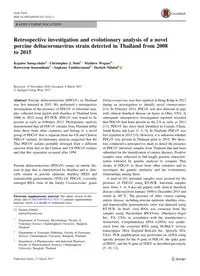
2017 Retrospective investigation and evolutionary analysis of a novel porcine deltacoronavirus strain detected in Thaila PDF
Preview 2017 Retrospective investigation and evolutionary analysis of a novel porcine deltacoronavirus strain detected in Thaila
RAPID COMMUNICATION Retrospective investigation and evolutionary analysis of a novel porcine deltacoronavirus strain detected in Thailand from 2008 to 2015 Kepalee Saeng-chuto1 • Christopher J. Stott1 • Matthew Wegner2 • Raweewan Senasuthum3 • Angkana Tantituvanont3 • Dachrit Nilubol1 Received: 15 November 2016 / Accepted: 8 March 2017 � Springer-Verlag Wien 2017 Abstract Porcine deltacoronavirus (PDCoV) in Thailand was first detected in 2015. We performed a retrospective investigation of the presence of PDCoV in intestinal sam- ples collected from piglets with diarrhea in Thailand from 2008 to 2015 using RT-PCR. PDCoV was found to be present as early as February 2013. Phylogenetic analysis demonstrated that all PDCoV variants from Thailand differ from those from other countries and belong to a novel group of PDCoV that is separate from the US and Chinese PDCoV variants. Evolutionary analysis suggested that the Thai PDCoV isolates probably diverged from a different ancestor from that of the Chinese and US PDCoV isolates and that this separation occurred after 1994. Porcine deltacoronavirus (PDCoV) causes an enteric dis- ease in pigs that is characterized by diarrhea and is clini- cally similar to porcine epidemic diarrhea (PED) and transmissible gastroenteritis (TGE) [4]. PDCoV, a recently emerged RNA virus of the family Coronaviridae, genus Deltacoronavirus, was first reported in Hong Kong in 2012 during an investigation to identify novel coronaviruses [14]. In February 2014, PDCoV was first detected in pigs with clinical diarrheal disease on farms in Ohio, USA. A subsequent retrospective investigation reported revealed that PDCoV had been present in the US as early as 2013 [11]. PDCoV has since been identified in Canada, China, South Korea and Laos [1, 6, 9]. In Thailand, PDCoV was first reported in 2015 [10]. However, it is unknown whether PDCoV was present in Thailand prior to 2015. We there- fore conducted a retrospective study to detect the presence of PDCoV intestinal samples from Thailand that had been submitted for the identification of enteric diseases. Positive samples were subjected to full-length genome characteri- zation followed by genetic analyses to compare Thai strains of PDCoV to those from other countries and to investigate the genetic similarity and the evolutionary relationships among them. A total of 241 intestinal samples were assayed for the presence of PDCoV using RT-PCR. Intestinal samples were from 3- to 4-day-old piglets with clinical diarrheal disease collected from January 2008 to December 2015 and stored at -80 �C. The presence of other viruses causing enteric disease, including porcine epidemic diarrhea virus, and transmissible gastroenteritis virus was detected using RT-PCR. In brief, viral RNA was extracted from the samples using NucleoSpin RNAVirus (Macherey-Nagel Inc., PA, USA) in accordance with the manufacturer’s instructions. Complementary DNA (cDNA) was synthe- sized from the extracted RNA using M-MuLV reverse transcriptase (New England BioLabs Inc., Ipswich, MA, USA). PCR amplification was performed on cDNA using specific primers for the N gene of PDCoV, the spike gene of PEDV, and the N gene of TGEV as described previously [5, 10, 12]. Electronic supplementary material The online version of this article (doi:10.1007/s00705-017-3331-3) contains supplementary material, which is available to authorized users. & Dachrit Nilubol
